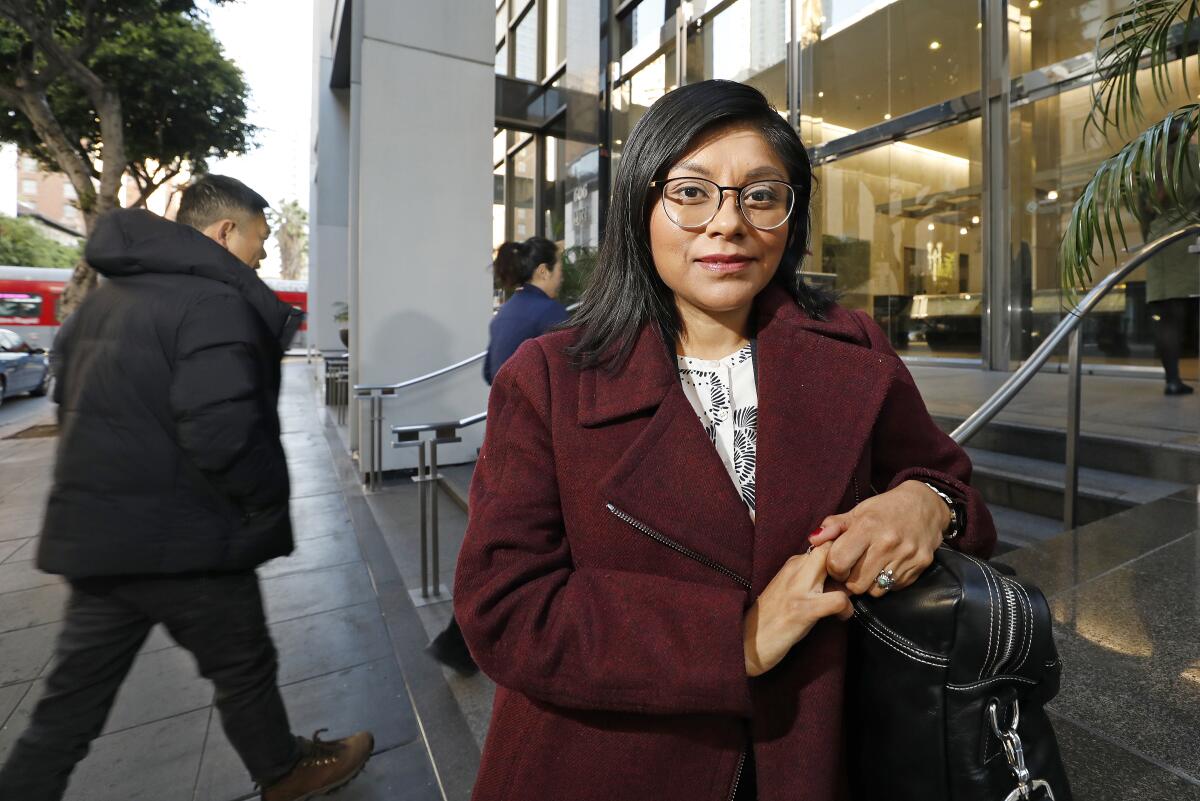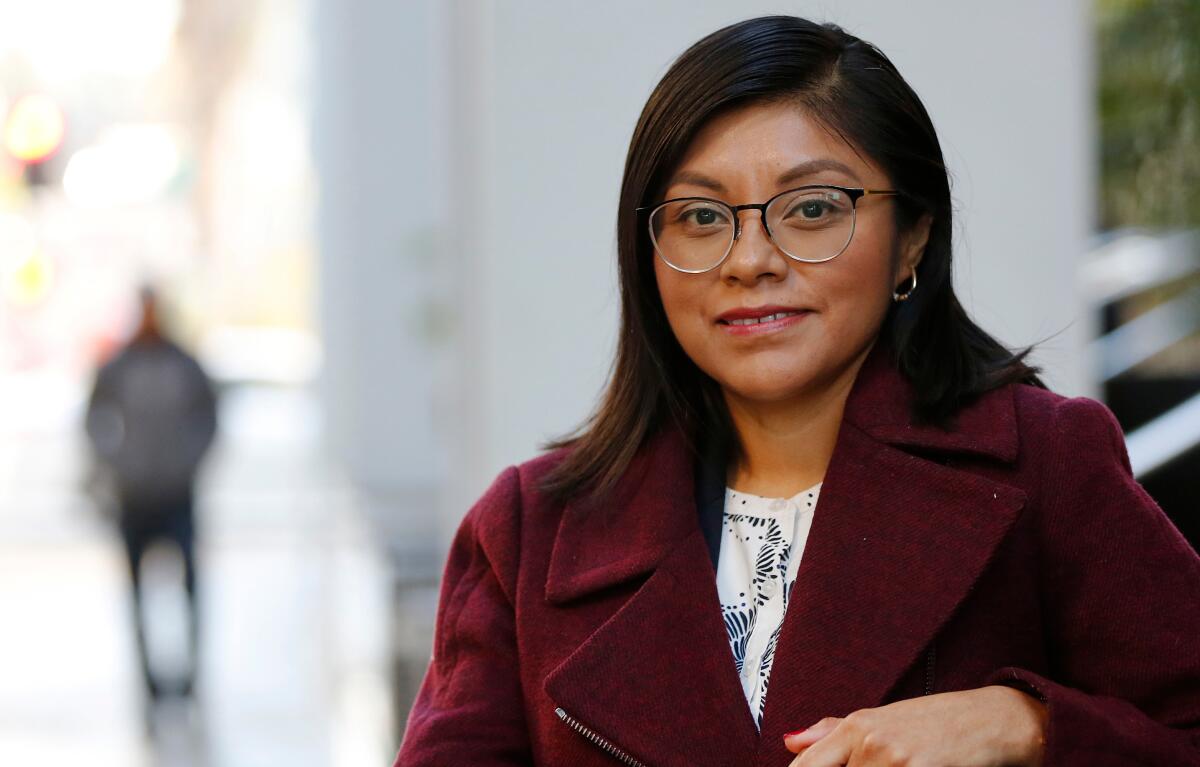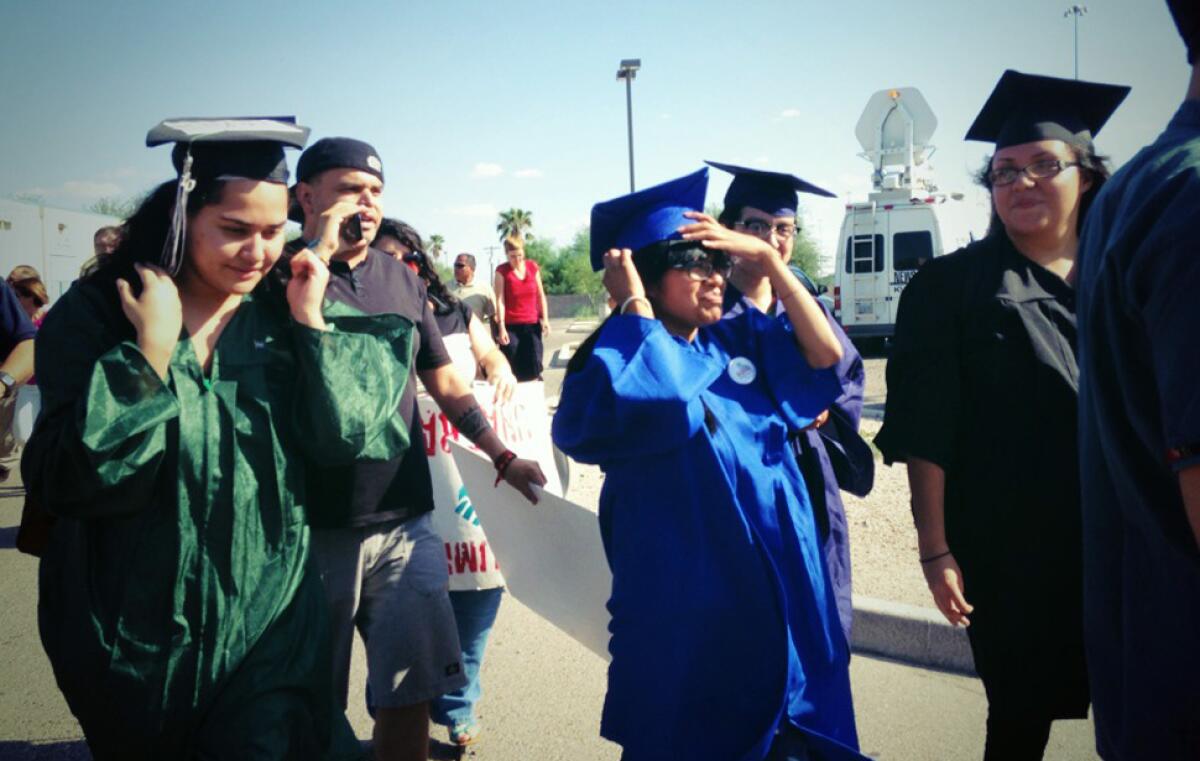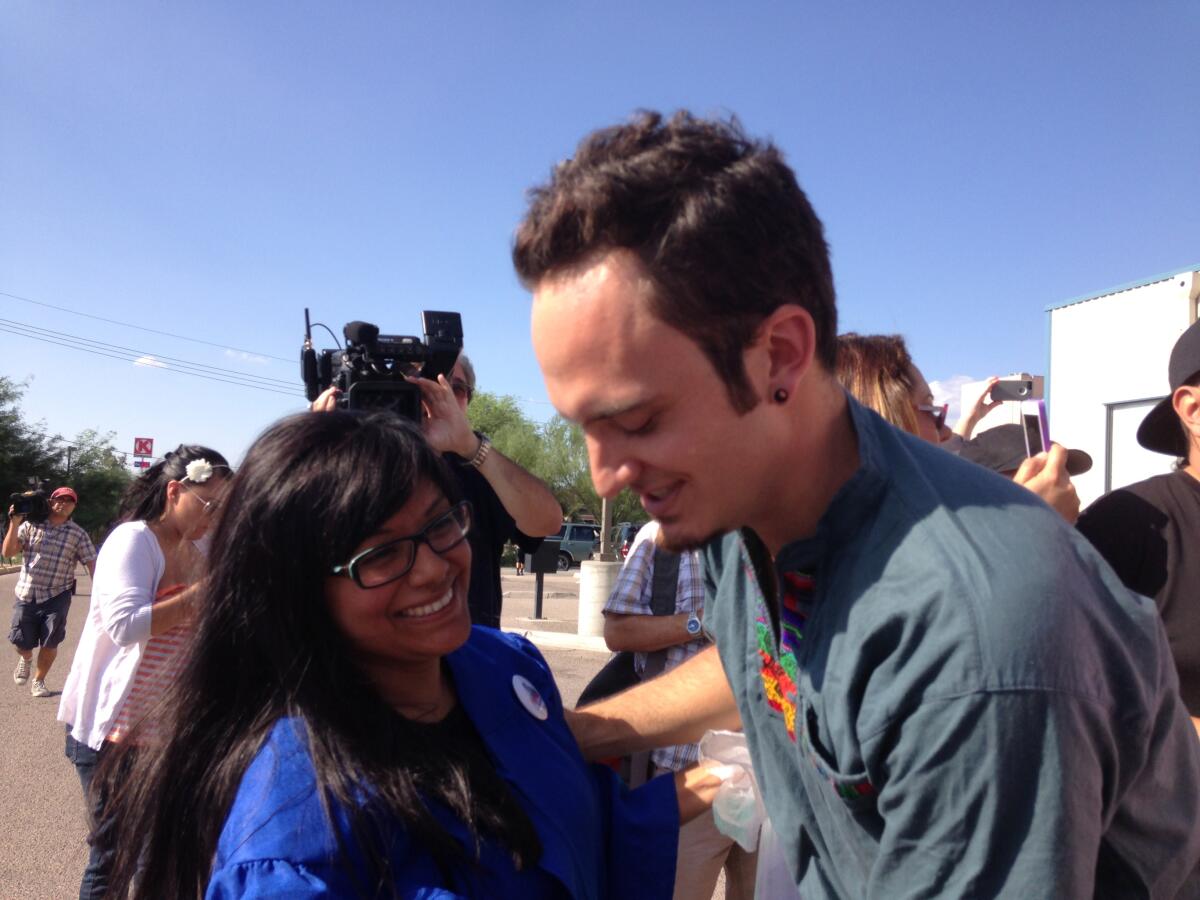Column: This immigration attorney understands her clients. She’s undocumented, too

On Friday morning, attorney Lizbeth Mateo went to immigration court in downtown Los Angeles to represent a client with whom she has something in common.
She’s undocumented, too.
Mateo wore a navy blue suit, carried a binder stuffed with court records and announced herself to the immigration judge conducting a hearing. She has no more protection from arrest and deportation than any of her clients, but that’s not something she thinks about on the job.
Mateo explained to the judge that her client — a middle-aged man who has lived in the U.S. for three decades — has a daughter who is becoming a naturalized citizen and has agreed to sponsor her father. The man also has a long-pending asylum case. The judge, whose calendar is jammed, set a court date for next January. The case backlog in California was 178,000 as of last November, with more than 1 million cases stacked up nationally.
Mateo says her own status does not come up in court, and she’s never sure whether judges or other lawyers know that the polished, savvy 34-year-old woman advocating on behalf of her clients does not have legal status herself.
“I’m a walking contradiction,” Mateo had told me a day earlier in her Wilmington law office.
I’d heard about Mateo and decided this would be a good time to pay a visit. With Donald Trump in the White House and an election year upon us, immigration is going to remain at the center of national political debate in 2020. And California will continue to be derided by critics as a carnival of soft-headed, pro-immigration liberals run amok.
A place where someone who’s undocumented can be a lawyer, thanks in part to a state Supreme Court ruling in 2014.
And even serve on a state commission.
“While Donald Trump fixates on walls, California will continue to concentrate on opportunities,” Kevin de León said in March of 2018 when, as Senate president pro tem, he appointed Mateo to an unpaid post on a state advisory committee studying ways to help underserved students go to college.
De León said at the time that Mateo “embodies California values and the American dream,” and he called her “a courageous, determined and intelligent young woman who at great personal risk has dedicated herself to fight for those seeking their rightful place in this country.”
Two people took a lot of heat for that appointment.
“I got death threats, the whole bit,” says De León, who is now running for Los Angeles City Council. He said he still stands by Mateo, though, and that she is “living the courage of her convictions” by being open about her status rather than cowering in the shadows.

“There were some really angry people who said really nasty things,” said Mateo, whose critics found her on social media and called her office with tirades and physical threats. “They said ICE is coming, they’re going to report me and they hope Trump sends the Army.”
But Mateo is not the type who’s easily shaken, and her story helps explain her spirit.
She grew up in a time and place, in southern Mexico, in which few women went to college, but she was determined to break through. Some of her aunts tried to steer her toward cooking and tortilla making, but she was more interested in hanging out at the library.
In sixth grade, a teacher handed back a math test and told Mateo she had flubbed it. She was walking away when the teacher asked if she really believed she got the answers wrong.
No, Mateo said. And she was right.
“When someone tells you something is wrong and you know it’s right,” Mateo recalls the teacher saying, “you have to defend your work.”
In her heart, even at such a young age, she knew she wanted to be a lawyer.
She was 14 when her parents decided to risk a border crossing in pursuit of greater opportunity for Mateo and her two brothers. She says they had lots of relatives in California, some of them here legally. She was under the impression the plan was for her parents to make some money and then move everyone back home two years later.
But they stayed. Lizbeth went to Venice High, struggled with English, couldn’t make sense of L.A., and was miserable at first.
“I couldn’t stand being in school, didn’t understand things and felt isolated and very stupid. In Mexico, I was outgoing and always raising my hand and answering questions,” Mateo said. “I remember one day I came home crying and told my mom I wanted to go back to Oaxaca and live with my grandmother. She said OK, we’ll send you back if that’s what you want. But you have to wait because we don’t have any money.”
But she stuck it out, with her father telling her school was all that mattered, and before long she was taking college prep classes. Her heart was broken when she realized her college options might be limited because she was undocumented, and she briefly considered enlisting in the U.S. Navy.
But after Venice High she went to Santa Monica College, then got a degree at Cal State Northridge, only to be discouraged again when she discovered that her job prospects and grad school opportunities were limited by her status.
“For a long time I was angry and there was a lot of resentment,” Mateo said, but she channeled all that energy into a cause. She linked up with other undocumented students to lobby for the doomed Dream Act, which would have provided a pathway to citizenship for undocumented youths who were brought to the U.S. as children.

In 2013, Mateo and eight other activists — they were known as the Dream 9 — made headlines by traveling south of the border and then coming back north to protest immigration policy and 9 million deportations during the Obama administration.
Some immigration reform activists cheered, while others feared the tactic could sabotage the chances of reform. Mateo and the others were arrested and Mateo was locked up for two weeks before being released back into the U.S.
It was just in time for her to begin classes at the Santa Clara University, where she had been accepted into the law school.
The first year of law school can be brutally difficult and the materially dreadfully dry, said professor Michelle Oberman, who taught Mateo’s contract law class. Mateo, the professor recalled, wasn’t sure law school was for her despite a desire “to pursue justice,” as if it were her moral obligation.
“There was a level of determination that is very rare and inspirational and … what was amazing was that she led others,” said Oberman. “She’s a hero of mine and in this day of big egos she’s quite centered. … It’s all in the service of others and it’s not about her. That’s what’s most singularly impressive.”
Mateo got her law degree, she passed the bar, she worked at a nonprofit defending immigrant victims of wage theft, and she opened her own law office in Wilmington two years ago, where about a third of her cases involve immigration.

The Dream Act never made it, but DACA (Deferred Action for Childhood Arrivals) became law under President Obama in 2012. In an ironic twist, Mateo’s application for DACA protection was denied because leaving the country for the Dream 9 protest disqualified her.
Luis Angel Reyes Savalza, the San Francisco attorney who has represented Mateo’s fight for DACA protection, is himself undocumented. But he has DACA protection, and said he knows of only one other attorney in the United States besides Mateo who is undocumented and has no DACA protection.
“Any of us with DACA owe Lizbeth and the movement,” said Reyes Savalza.
I asked if he feared that in this fevered political climate, Mateo could be deported.
“I wouldn’t say I worry about her. I’d say I’m very much inspired by her, and she’s inspired many others in her outspokenness and her activism,” Reyes Savalza said. “I do think she’s taking a very calculated risk, and I think it speaks to the kind of person she is that she puts community first.”
Mateo told me she was not surprised by Trump’s focus, as a candidate, on people living illegally in the U.S., or on his blaming immigrants for some of the country’s woes. She was disappointed, though, by Democratic candidates who didn’t respond more forcefully.
She wants to believe there will be a pathway to citizenship someday for people like her, people who have struggled, contributed, dreamed. She wants to believe there is a future for her here, where she has lived for most of her life.
The United States may not be perfect, Mateo said, “but it provides opportunities. So much so that someone like me, who came from a tiny town in Oaxaca — with parents who only finished sixth grade, nothing more — could make it and become an attorney.”
More to Read
Sign up for Essential California
The most important California stories and recommendations in your inbox every morning.
You may occasionally receive promotional content from the Los Angeles Times.











